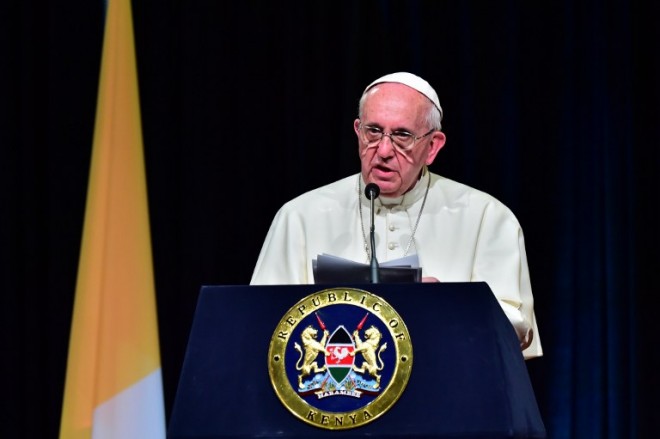Pope Francis denounces radicalization, ‘barbarous attacks’
NAIROBI, Kenya—Pope Francis on Thursday denounced radicalization of young people and “barbarous attacks” carried out in the name of religion during the first leg of his three-nation Africa tour.
“His holy name must never be used to justify hatred and violence,” Pope Francis said in the Kenyan capital as he met religious leaders of different faiths, citing “barbarous attacks” by Islamic extremists in Nairobi, Garissa and Mandera.
“All too often, young people are being radicalized in the name of religion to sow discord and fear, and to tear at the very fabric of our societies,” the Pope said nearly two weeks after a group of jihadists, many of them French, killed 130 people in a string of gun and suicide attacks in Paris.
“How important it is that we be seen as prophets of peace, peacemakers who invite others to live in peace, harmony and mutual respect,” he said.
Kenya has suffered numerous deadly attacks since sending its army into neighboring Somalia in 2011 after a string of kidnappings it blamed on al-Qaida’s east Africa branch, the Shebab.
At least 67 people died in an armed assault on Nairobi’s Westgate shopping mall in 2013 and 148 were killed in an attack on a university in Garissa in April.
In both attacks, the gunmen made efforts to separate Muslims from non-Muslims before executing the latter.
Although Kenya sees the Shebab threat as primarily external, experts say the country faces internal dangers with marginalized youth easy targets for radicalization and recruitment to extremist groups.
“Our world today is characterized by reckless wars mired in greed, malice, treachery, self-centeredness, blackmail and we are increasingly treated to the very theater of the most absurd,” said Abdulghafur El–Busaidy, chair of the Supreme Council of Kenyan Muslims.
Anglican leader Eliud Wabukala said Africa was “at a spiritual crossroads” and warned against the threat of “the ideological colonialism of secularist lifestyles.”
